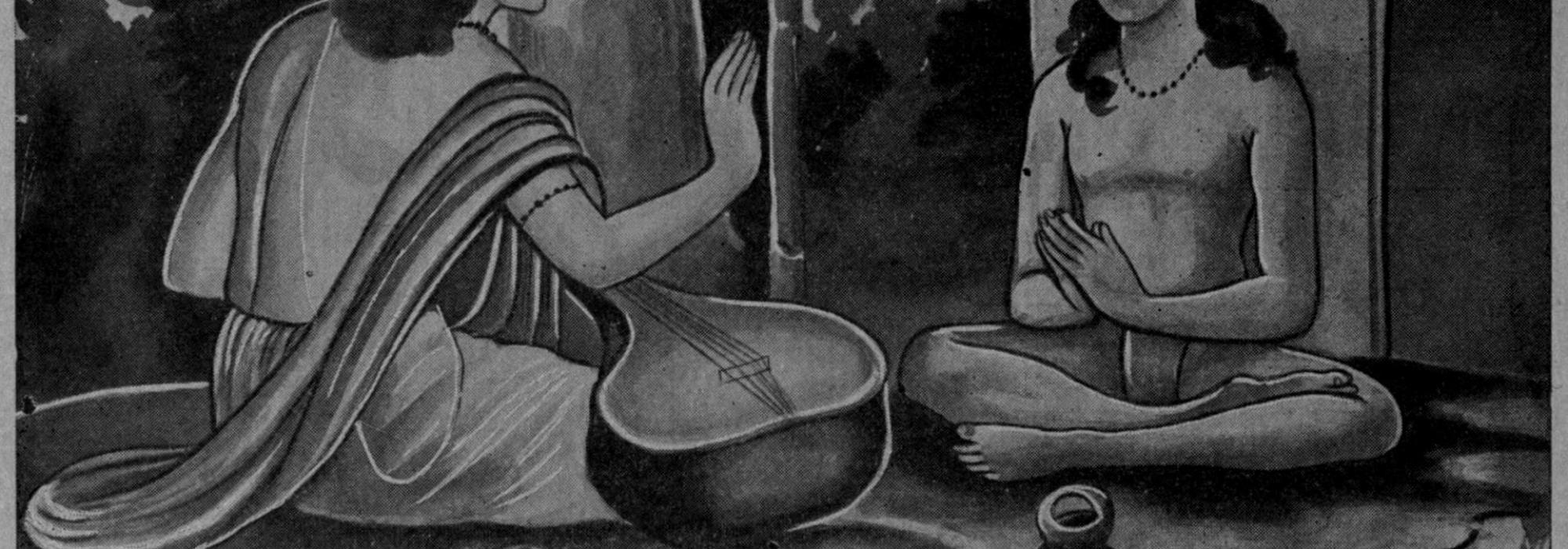In the second part of this series, we take a look at the next twenty-one sutras of Narada on bhakti (verses 22 to 42).
तत्रापि न माहात्म्यज्ञानविस्मृत्यपवादः । २२
22. Even so (in the case of the cowgirls), one can’t criticize them of being oblivious to the awareness of divinity.
तद्विहीनं जाराणामिव । २३
23. Without this awareness, (love) is akin to the lust of a paramour.
[Without the awareness of divinity, love gets reduced to lust. This sutra emphasizes that true love transcends mere lust. The love between the gopikas and Krishna (or even the love between two people here and now) is different from the lust of an illicit affair.]
नास्त्येव तस्मिन् तत्सुखसुखित्वम् । २४
24. In that (lust) one does not derive happiness from the happiness of the beloved.
[The fundamental trait of true love is that one finds sukha (happiness, comfort) in the sukha of the other. On the other hand, lust is a selfish fulfillment.]
सा तु कर्मज्ञानयोगेभ्योऽप्यधिकतरा । २५
25. This (bhakti) is indeed greater than karma, jnana, or yoga.
[karma = work, undertaking action with expectations; jnana = wisdom, the path of study and reason; yoga = discipline of body and mind]
फलरूपत्त्वात् । २६
26. It is a result in itself.
ईश्वरस्याप्यभिमानद्वेषित्वात् दैन्यप्रियत्वात् च । २७
27. Even the Supreme hates arrogance and loves humility.
तस्याः ज्ञानमेव साधनमित्येके । २८
28. Some feel that jnana is the only means to (attain bhakti).
अन्योन्याश्रयत्वमित्यन्ये । २९
29. Others feel that they (jnana and bhakti) depend on each other.
स्वयं फलरूपतेति ब्रह्मकुमारः । ३०
30. (Bhakti) is an end in itself according to Narada.
राजगृहभोजनादिषु तथैव दृष्टत्वात् । ३१
31. Like seeing royal palaces, food, etc.
न तेन राजा परितोषः क्षुच्छान्तिर्वा । ३२
32. It (seeing a royal palace) doesn’t satisfy a king nor does it (seeing food) help us appease hunger.
[Sutra #31 basically says, ‘Take the example of seeing a palace or seeing food,’ and #32 basically says, ‘Seeing a palace doesn’t satisfy a king; seeing food doesn’t appease hunger.’ In the following sutra, a generalization is given.]
तस्मात् सैव ग्राह्या मुमुक्षुभिः । ३३
33. Those who seek moksha must adopt it (the path of bhakti).
[Seekers of moksha (release, liberation, bliss) have to actively walk on the path of bhakti, just as a hungry person must eat the food (and not just see it).]
तस्याः साधनानि गायन्त्याचार्याः । ३४
34. The acharyas sang (a song) about the means to it (bhakti).
तत्तु विषयत्यागात् सङ्गत्यागात् च । ३५
35. That (bhakti) is indeed (known) by renouncing the sensates and renouncing (worldly) attachments.
[Sensates are those which are experienced by the senses. Traditionally, the five sensates are sound, sight, smell, taste, and texture.]
अव्यावृत्तभजनात् । ३६
36. (We attain bhakti) by constantly singing songs of praise.
लोकेऽपि भगवद्गुणश्रवणकीर्तनात् । ३७
37. Even in the world, (bhakti is spread) by narrating and hearing about the traits of the Supreme.
मुख्यतस्तु महत्कृपयैव भगवत्कृपालेशाद् वा । ३८
38. The main (path to bhakti) is the compassion of greats or a fragment of divine grace.
महत्सङ्गस्तु दुर्लभोऽगम्योऽमोघश्च । ३९
39. The company of greats is extraordinary and not easy to attain but unfailing (in effect).
लभ्यतेऽपि तत्कृपयैव । ४०
40. It (the company of greats) is attained by the grace of That (the Supreme).
तस्मिंस्तज्जने भेदाभावात् । ४१
41. There is no difference between That (the Supreme) and Its (Supreme’s) people.
तदेव साध्यतां तदेव साध्यताम् । ४२
42. Cultivate only this, cultivate only this (the company of greats).
I'm grateful to Shatavadhani Dr. R. Ganesh for his review of my translation.















































